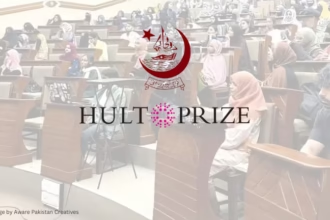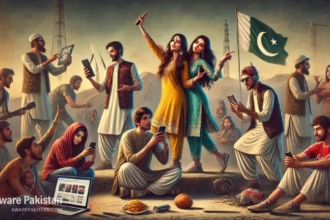Pakistan’s monetary policy plays an important role in tackling ‘BOP ‘balance of payment’ (BOP) related issues in the country. However, the shady elements of the policy are craftily hidden using buzzwords. Buzzwords play a unique role in suggesting solutions to problems and grasping citizens’ attention towards the government’s narrative. Buzzwords have a political element attached to them and they set up a positive discourse on development. World organizations and governments use these words to appeal to the masses. In order to analyze the impact of buzzwords on a country’s policies and ultimately the country itself, attention-grabbing words used in different policies do more than just provide a sense of direction to the people. They legitimize the interventions of the government in the eyes of the common man, as these words attach some meaning to the otherwise not-so-helpful policy. I will be using the monetary policy of Pakistan as a case study to explain the impact of buzzwords on the country’s economy. The monetary policy of Pakistan controls the country’s interest rate and exchange rate, monitored by the State Bank of Pakistan. The current interest rate set for the country under this policy is 16.00% p.a. (State Bank of Pakistan).
The monetary policy of Pakistan uses the central bank to ‘influence’ interest rates and money supply in the country. The word ‘influence’ is a buzzword here because it signals that Pakistan’s monetary policy is in charge of its money-related issues. I call ‘influence’ a buzzword because the monetary policy of Pakistan is not in line with the minds of the country. This word has a Eurocentric element attached to it. Pakistan has been in the IMF program for the past 73 years (Zaman, 2022). Joseph Stiglitz argues that the IMF is an international organization that has trapped developing countries and caused lower amounts of development in them (Council on Foreign Relations). It would not be wrong if I assert that the IMF has thrown Pakistan into a bottomless pit where there is no possible way out. It claims to strengthen Pakistan’s macroeconomic development, however, the IMF does the opposite. Since not every individual in the country is proficient in economics, it becomes quite easy for politicians and international organizations to lure common citizens into their narratives of ‘Development’.
Pakistan is in the IMF program for the past 73 years…It would not be wrong if I assert that the IMF has thrown Pakistan in a bottomless pit where there is no possible way out.
As Pakistan is a country that goes to the IMF for loans to stabilize its currency reserves, it has to keep its monetary policy in line with its negotiations with the international organization. The SBP Act 1956 states that the purpose of the monetary policy is to attain monetary ‘stability’ and achieve full ‘utilization’ of the country’s resources. The word ‘stability’ has a very positive and reassuring connotation attached to it. This basically means that whatever interest rate or exchange rate Pakistan may have, it will always support the country’s economy in stabilizing it. The interest rate is set according to the requirements of the IMF and not the people of Pakistan, hence the notion of ‘stability’ is a paradoxical concept here. For instance, the current exchange rate of Pakistan is 16%, which may not be as ideal as it should be because of the country’s alarming debt condition. Pakistan’s current external debt is $12.83 million (Our Correspondent, 2022). This amount is expected to increase because the country is in need of more reserves to somehow stabilize its plunging exchange rate. What the masses do not realize is that a higher interest rate will only increase the already mountainous pile of external debt, and this will further weaken the country in terms of its sovereignty in the decision-making process. This is how international financial institutions weaken the economies of third-world countries like ours.
Moving ahead, the State Bank of Pakistan claims that its monetary policy is set to achieve “financial stability” in the market. This basically means that the monetary policy is designed in such a way that it helps strengthen a country’s exchange rate system. The phrase “financial stability” helps to whitewash the dangerous impacts of higher interest rates as it builds a positive image in the minds of the people (Peter G. Peterson Foundation, 2022). Financial stability means that the country’s financial condition will improve, i.e., the debt burden will be lower, leading to improved lifestyles for the people. This is something that will definitely attract the attention of people and make them ignore the repercussions of higher interest rates. The issue at hand is framed in such a favorable way that it forms a discourse. What people may not realize is that higher interest rates are a reflection of neoliberalism, which is a hidden threat to their economy. People in third-world countries are easier to attract by using buzzwords such as “financial stability” because they are frequently in financial crisis. People believe that such policies help in the development of the country. However, this is not necessarily true. Lower exchange rates are hazardous for third-world countries like Pakistan because they are mostly reliant on imports. Hence, they get to purchase expensive products, which have an adverse impact on their balance of payments.
What the masses do not realize is that a higher interest rate will only increase the already mountainous pile of external debt, and this will further weaken the country in terms of its sovereignty in the decision making process.
Moreover, the monetary policy states that it is designed to help people make ‘economically important decisions.’ This basically means that the policy is made to facilitate the people in terms of their expenditures on a day-to-day basis. The policy rates would be set in accordance with the benefit of the people. However, this is not the case. As discussed earlier, Pakistan’s monetary policy is designed according to the demands and requirements of the IMF. Hence, the only role the country plays is policy implementation. The inclusion of the IMF in Pakistan’s monetary policy highlights the hegemonic influence of the West in our country. The IMF works as a tool of the US to tamper with the economies of third-world countries and shape their discourse. Thus, the monetary policy forces people to make decisions not as to what they personally desire but as to what is presented to them in the shape of a ‘policy.’
In conclusion, I would like to assert that the buzzwords in this policy, i.e., influence, utilization, stability, and economically important decisions, only act as a mask. Pakistan’s monetary policies are always in line with IMF requirements. The IMF and World Bank are control instruments used by hegemonic powers such as the US to control the economies of developing countries. Buzzwords help to hide the true nature of the policy from the people, and they further help in expanding the influence of global hegemony. The world works on the principle of “balance of power”; hence, global hegemonies would go to any extent to sustain their stronghold and influence on smaller economies. The discourse formed around development is nothing but a whitewash that hypnotizes smaller economies such as Sri Lanka, Pakistan, Afghanistan, and Sudan to fall into a trap. While the World Bank and the IMF may claim to be working for the betterment of the country, these two organizations have always acted in the best interests of the US. I would like to suggest that there should be more research by Pakistani academicians on the prolonged use of buzzwords and that they should try to form a new discourse around development and economics. This is so that the citizens do not fall prey to the Eurocentric discourse on the economy and development. Pakistani economists should be given a chance to suggest monetary policy interventions that would take us out of the gloomy economic mess we are in now.







